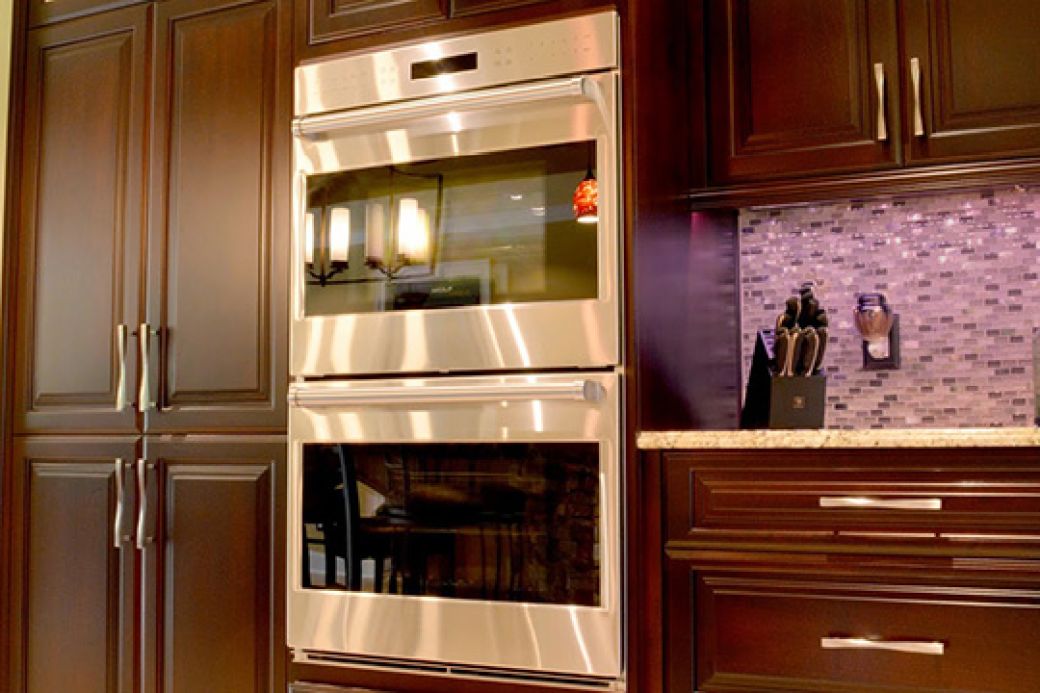For home cooks, a wall oven means flexibility and convenience that boost kitchen function and home enjoyment.
We give you food for thought so you can pick the best model for your household’s lifestyle.
First Things First: Gas or Electric?
Typically, the type of power you use in your home determines whether you go with a gas or electric wall oven. If you can go either way, budget and cooking preferences will drive your final decision. Here’s more to chew on:
- Electric wall ovens heat foods more evenly than gas and are considered easier to clean, according to Consumer Reports.
- There’s a much larger selection of electric units than gas to choose from.
- Budget and standard ovens that run on gas generally cost $100 or more than their electric counterparts.
Types of Wall Ovens and Costs
Here’s a breakdown of models and standard features. All are usually available in a black, white, or stainless steel finish.
1. Conventional electric
Budget wall ovens are the least expensive available, with a price range of $700 to $1,000. Either dials or electronic touch pads control oven settings and cooking temperatures. Stainless models usually cost $100 more than black or white units.
Standard wall ovens come with self-cleaning features, which add $200 to $300 to their price tag ($1,000 to $1,300). Most have electronic touch pads for oven settings and cooking temperatures.
Double ovens come with self-cleaning features and electronic touch pads for oven settings and cooking temperatures. They cost $1,500 to $2,100.
Single ovens with microwave have one built-in oven and one built-in microwave. They come with a steep price tag ($2,100 to $2,500). Most have self-cleaning features and are equipped with electronic touch pads for oven and microwave settings.
2. Electric convection
Standard convection wall ovens use fans to distribute heat, which speeds up baking and roasting times. Most models come with self-cleaning features. On average, they cost $300 more than standard electric wall ovens without the convection feature. All have electronic or digital controls for oven settings and cooking temperatures. Cost: $1,400 to $2,100.
Double convection wall ovens come with self-cleaning features. The most expensive units ($2,150 to $3,700) are Wi-Fi enabled so you can control temperature and cooking times via a smartphone or mobile device. All have electronic or digital controls for oven settings and cooking temperatures.
Single convection oven and microwave combinations come with one oven and one microwave. They typically have a steep price tag: $2,500 or more. Most combo ovens have self-cleaning features and electronic or digital controls for oven and microwave settings.
3. Gas ovens
Budget gas wall ovens are the least-expensive, with prices ranging from $800 to $1,100. They come with either dials or electronic touch pad controls for oven settings and cooking temperatures. Stainless units start at $1,000.
Standard gas wall ovens come with self-cleaning features and a lower broiler, which add $400 to $500 to their price tag. Most have electronic touch pad controls for oven settings and cooking temperatures. Cost: $1,300 to $1,500.
Convection gas wall ovens do exist. But consumer models are almost as rare as dodo birds, since you won’t find them at most big box stores. Fans of these ovens appreciate the moist heat gas generates (a byproduct of gas combustion is water vapor). Luxury appliance retailers typically sell pro-styled gas convection wall ovens. Units start at $3,500.
Size Does Matter
Wall units offer plenty of flexibility when it comes to kitchen placement. They can be installed at any convenient height, putting an end to the bending and stooping that comes with a conventional kitchen range.
Wall ovens are available in widths of 24, 27, and 30 inches. Keep in mind some styles may skew an inch or two bigger or smaller; check oven specs before you buy.
You’ll also need to make sure your oven’s interior space is big enough for your cooking needs:
- 2 to 3 cubic feet will accommodate households with one or two people.
- 3 to 4 cubic feet will accommodate households with three or four people.
- 4 cubic feet and more will accommodate households of four or more.
Features, Functions, and Extras That Have the Biggest Payback
We think the features that pack the most value will boost convenience and ease of use. Here’s a list of tasty picks:
Control lockout prevents little hands from playing with the oven by disabling the control panel.
Double ovens are a win-win for hardworking kitchens. They let you simultaneously bake and roast multiple items at different temperatures.
Electronic controls are featured on most wall ovens (except a few budget models and lower-priced double ovens). Unlike old school oven dials, electronic controls allow you to set precise cooking temperatures.
A self-cleaning cycle makes cleaning your oven less of a chore.
Removable oven doors allow quick and easy cleaning and wiping.
Sabbath mode settings allow observant Jews to preprogram oven settings during the Sabbath so they can heat foods. If you’re not in the know, the Sabbath is a day of rest and using modern appliances during this time is forbidden.
Features You Shouldn’t Pay More For
Warming drawers keep prepared foods warm prior to mealtime, but they're sold as separate units and come with a chilly price tag: $1,000 and up.
Delayed-start and other Wi-Fi features allow you to control your oven when you’re not home. However, the National Fire Protection Association says you should never operate your oven when you’re not home to check on it.
Related: The Best Time to Buy Appliances
